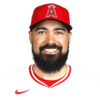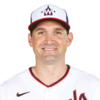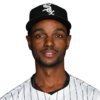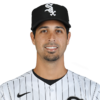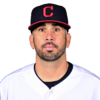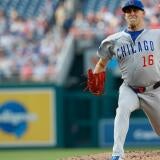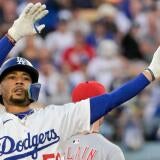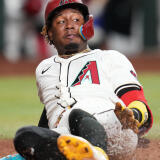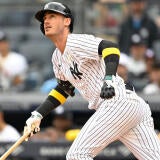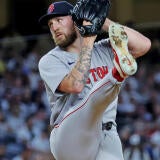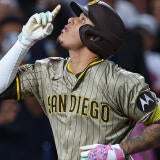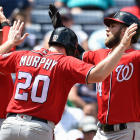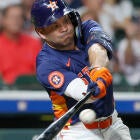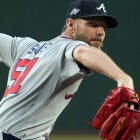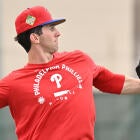
2017 Fantasy Baseball Draft Prep: Nationals team outlook still as bright as any with star-studded roster bolstered by Trea Turner, Adam Eaton
With the kind of talent on their roster, the Nationals should be a lock for the postseason. But some of their highest-profile players have lingering questions about their upside, according to Scott White.

In about five years' time, the Nationals have gone from bottom-feeder franchise to perennial disappointment, skipping right over the feel-good overachiever period that can usually stave off a championship-or-bust mentality for a couple years.
Why? They're stacked, and everyone knows it. Not only do they have the funds to lure top free agents like Max Scherzer and retain many of their homegrown players, but they also picked the perfect time to rebuild, landing historic talents like Stephen Strasburg and Bryce Harper in back-to-back seasons (while making good on some of the harder picks in between).
Shoot, for all the hype they got, you could make the argument that Strasburg and Harper haven't even fully come through. That was certainly the case last year, and yet the Nationals won 95 games anyway.
You see? Stacked.
So many of their decisions seem to go oh so right. When they splurged last offseason on a three-year deal for Daniel Murphy, who didn't have the most robust market, he emerged as a legitimate MVP candidate. When they needed to help facilitate the Wil Myers deal between the Rays and Padres, they came away with the best player of all, Trea Turner (as well as maybe the third-best, Joe Ross). From the trade market to the free agent market to the draft, they give the impression that they know what they're doing.
And yet they haven't advanced past the first round of the playoffs during this five-year stretch, twice missing the postseason altogether.
Part of it's because of the inconsistencies I mentioned for Strasburg and Harper, but they aren't the only Nationals with lingering questions about their upside. Longtime cornerstone Ryan Zimmerman seems to be in premature decline. Anthony Rendon, though a solid player, hasn't lived up to the standard he set in 2014. And who knows how much Murphy and Turner will regress after their unbelievable 2016 performances?
The Nationals didn't bother to re-up Wilson Ramos, who emerged as one of the game's top offensive catchers last year, but they made up for it and then some by acquiring Adam Eaton, albeit at the steep cost of top pitcher prospects Lucas Giolito and Reynaldo Lopez. They may need some pitching depth, too, if Tanner Roark can't follow up his peripherally anomalous season or if Gio Gonzalez continues to slide.
Then again, they're due for a year where everything goes right.
| 1 |
Adam Eaton
CF
|
| 2 |
Trea Turner
SS
|
| 3 | 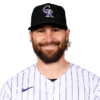
Daniel Murphy
2B
|
| 4 |
Bryce Harper
RF
|
| 5 | |
| 6 | 
Jayson Werth
LF
|
| 7 | |
| 8 | 
Derek Norris
C
|
| Bench | 
Stephen Drew
2B/3B/SS
|
| Bench | 
Clint Robinson
1B/OF
|
| Bench | |
| 1 |
Max Scherzer
RHP
|
| 2 | |
| 3 |
Tanner Roark
RHP
|
| 4 |
Gio Gonzalez
LHP
|
| 5 |
Joe Ross
RHP
|
| Alt SP |
A.J. Cole
RHP
|
| Closer |
Shawn Kelley
RHP
|
| Setup |
Blake Treinen
RHP
|
| Relief |
Sammy Solis
LHP
|
| Relief |
Koda Glover
RHP
|
| Relief |
Oliver Perez
LHP
|
What happened to Bryce Harper?
Oh, how I wish I knew.
A report surfaced late in the year that he was playing through shoulder and neck discomfort, but the Nationals for some reason saw fit to deny it, inviting responses of "oh, so he's just bad, then."
Don't believe it -- the denial, I mean, not the report. Harper was maybe the most hyped prospect of all time, and his MVP 2015 season was peak Barry Bonds-type stuff. He went from producing at that same level in April, batting .286 with nine homers and a 1.121 OPS, to hitting .235 with 15 home runs and a .759 OPS the rest of the way. If injuries weren't the culprit, then Harper hired a look-alike so he could focus on making baseball fun again.
It's worth noting that his second-best stretch of the season came immediately after he took a week off to rest his aching body in mid-August, so a full offseason of rest may be all he needs. Investing a first-round pick in him seems like a gamble after the year he just had, but seeing as there's only nine no-doubt first-round hitters in this year's player pool, a late first-rounder seems fully justified.
How legit is Daniel Murphy?
I'm going to say something highly controversial now: The only reason I worry about Murphy heading into 2017 is because he's a 32-year-old with a spotty injury history.
The performance? I'm pretty sold on it. I realize it's a departure from a lengthy track record, but I'm a little more open to the mid-career transformation than the typical number cruncher might be, recognizing the level of difficulty in hitting a baseball and believing that something as simple as hand placement can make a world of difference.
Murphy changed his entire setup. He crouches low at the plate now and stands much closer to it as well, looking to drive the ball instead of just slapping it the other way.
It didn't just begin last year either. These changes he made at the suggestion of Mets hitting coach Kevin Long, which explains how he went off for seven home runs in the 2015 postseason. But did you know he hit .338 with five home runs and a .927 OPS in the two months before that? True story.
Make it a year-and-a-half of this kind of production, and Murphy's breakthrough becomes much easier to believe. For a late second-round pick, sign me up.
Is Shawn Kelley actually the closer?
That's whose name appears in the role on every depth chart, if only by default. Kelley was the one who stepped in for a disintegrating Jonathan Papelbon last year, after all, and did well for himself until Mark Melancon entered the picture. In fact, by the numbers, he looks like everything a closer should be, his 2.64 ERA ranking 39th among pitchers with at least 50 innings, his 12.4 strikeouts per nine innings ranking 11th and his 0.90 WHIP ranking eighth.
But he barely exceeded that 50-inning threshold in a season when he was completely healthy and filling the oft-overworked setup role. And the 58 innings he did throw were a career high at the advanced age of 32.
You see where I'm going with this, right? Durability is an important quality for closers, who are often needed two, three and sometimes even four days in a row. Only once last year was Kelley asked to do more than two, having two Tommy John surgeries in his past. He was also shielded from left-handed hitters and clearly wasn't the plan heading into the offseason, seeing as the Nationals came within a year of beating the Dodgers' offer for Kenley Jansen.
Plus, have you seen the rest of the Nationals bullpen? Kelley is the only reliever who would pass as top-flight, and contenders these days require more than one -- a brittle one at that. But what's left at this point? A trade for David Robertson?
I'm betting the Nationals come up with a solution before opening day, which is why Kelley isn't even in my top 30 relievers despite his top-15 upside. If nothing has changed by mid-March, though, I'll be moving him up.




